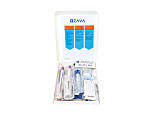Men Who Have Sex with Men Test Kit
Convenient STI Home Test For Men Who Have Sex With Men


Due to a national increase in coronavirus testing, our test lab partners are experiencing delays of up to 3-4 days when delivering results from other test kits. We ask for your patience and compassion during these unprecedented times, and we're deeply grateful for your continued understanding.
We offer two types of test kits designed for men:
Basic Screen - checks for gonorrhea and chlamydia (genital, anal and oral) as well as HIV and syphilis.
Full Screen - checks for gonorrhea and chlamydia (genital, anal and oral) as well as *herpes, HIV and syphilis plus hepatitis B and C. The full screen also checks for several less common infections.
The test kit comprises of a urine test, an oral and an anal swab as well as a small blood sample. The test kit is recommended for men who have had unprotected anal or oral sex as it detects infections in the throat and anus.
This test kit is particularly recommended for men who have sex with men.
If you’ve recently received a hepatitis B vaccination, you should wait 8 weeks before taking this test. You may get a false positive result if you take this test sooner.



About the men who have sex with men test kit
Who needs to get tested?
It is highly recommended for everyone who is sexually active to get tested for STDs at least once a year. If you have sex with changing partners, it is recommended that you get tested every three months, especially if you do not always use a condom.
Using the test kit
In your test kit you will find:
- an oral swab - this will be used to check for oral gonorrhea and chlamydia (transmitted during oral sex)
- a rectal swab - this will be used to check for gonorrhea and chlamydia infections of the anus
- a urine sample - this will be used to check for gonorrhea and chlamydia (plus gardnerella, herpes, ureaplasma, mycoplasma and trichomonas if you order the full screen)
- a small blood sample - this will be used to check for syphilis, HIV, (plus hepatitis B and C if you order the full screen)
The test kit contains detailed instructions on how to collect each sample. It is important that you follow these instructions carefully to get accurate test results.
When you’ve collected all samples, you need to post them to our partner laboratory, which will analyse them. You will find a pre-addressed and prepaid envelope in your test kit, which allows you to post you samples without having to pay any additional postage. You will receive your test results via our confidential and secure patient record - we will notify you via email or phone when they are ready to view. The email will not contain any confidential information or reference to your test.
*Note: This test might not detect genital herpes if you do not have active sores. If you are worried about this, it is best to use a swab test that is specifically designed to detect herpes.
STIs to check for
Gonorrhea
Gonorrhea is a bacterial infection which can affect the throat, anus or the sexual organs and urinary tract (depending on how it was transmitted). Gonorrhea can cause complications such as infertility and needs to be treated with antibiotics. Gonorrhea can be symptomless.
Chlamydia
Like gonorrhea, chlamydia bacteria can live in the throat, anus or genitals and the urinary tract. It can cause inflammation and infertility and, like other STIs, it increases your risk of contracting HIV. It is easy to treat with a course of antibiotics.
Hepatitis
The test kit includes a blood test for hepatitis B and C. Both can become chronic and lead to dangerous complications, such as liver failure.
HIV
HIV often remains symptomless during the beginning stages. It is important to get treated early on, in order to prevent AIDS. Treatment also makes it less likely that you pass on the virus to anyone else. The HIV blood test can only detect the presence of the virus from approximately four weeks after exposure. If you're worried that you've caught the virus during a recent sexual encounter, you should go to your sexual health clinic as soon as possible.
Syphilis
Syphilis is a sexually transmitted disease which can cause sores. If left untreated, it can lead to severe complications and may even be fatal. In the beginning stages, it can effectively be treated with antibiotics. In recent years, the diagnoses of syphilis have increased in numbers. The illness is particularly common in men who have sex with men. Like other STIs, syphilis increases your risk of catching HIV.
Herpes
Genital herpes is caused by the herpes simplex or cold sore virus. The symptoms are painful blisters on the genitals.
Other infections
Trichomonas are bacteria which can cause symptoms in men and women, causing a condition which is called trichomoniasis. Trichomoniasis is treated with a course of antibiotics.
Gardnerella are a type of bacteria which do not usually cause symptoms in men. However, an infection with Gardnerella can cause symptoms in women.
Ureaplasma are a type of bacteria which commonly occur in the genital tract of both men and women. It is not strictly speaking an STI and in most cases, it does not cause any symptoms. However, if you or your partner are experiencing symptoms and test positive, you may need to get treated.
Mycoplasma are bacteria, which are transmitted during sex. If your test result comes back positive, you need to get treated. Please note, that we are not able to treat Mycoplasma. You need to visit a GUM clinic to get treated for this condition.
When to test
Many STIs cannot be detected when testing straight after unprotected sex. Infections have different periods with no symptoms, during which they often can’t be diagnosed.
For HIV, if you think you may have contracted it in the last 72 hours, visit your local GUM clinic immediately. Otherwise, you can still test for it straight away using the home test kit, but if it comes back negative you will need to repeat the test later.
Up to 95% of HIV infections will show up at 4 weeks after you actually get infected, but it can take as long as 6 months before the test shows positive.
With hepatitis B or C it can take up to 6 months, with syphilis up to 13 weeks, for the infections to show up in tests. You can test before this, but if you get a negative result, you need to make sure you test again after the above timeframes to be sure.
For herpes, trichomoniasis, mycoplasma, ureaplasma, and gardnerella, it also takes up to 4 weeks for the infection to appear on tests. Wait 4 weeks before testing from the time you think you may have caught these infections.

Dr Nicholas Antonakopoulos graduated from the University of London in 2006. He did his postgraduate training in hospitals in the London area, and he trained for four years in Trauma and Orthopaedic Surgery before completing his training in General practice in 2015.
Meet our doctorsLast reviewed: 19 Mar 2019
